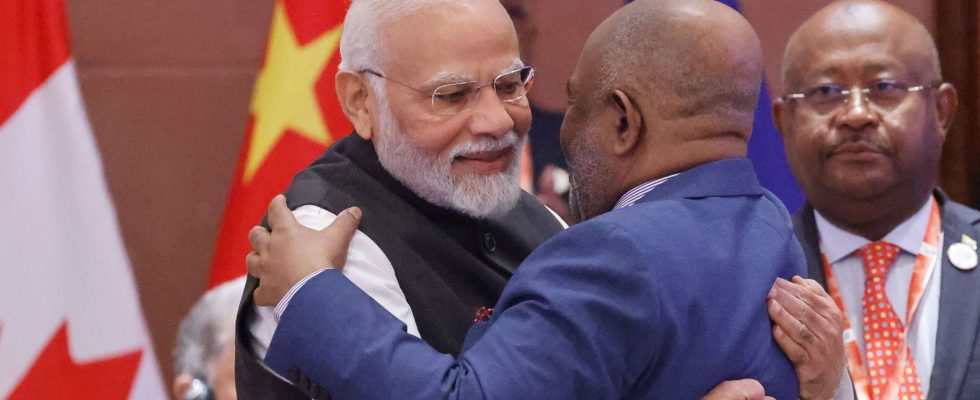The G20 will make more room for Africa. The African Union (AU) officially joined, on Saturday September 9, the closed club, whose leaders meeting in New Delhi – without XI Jinping and Vladimir Putin – must show that they are ready to make concrete commitments in favor of countries in development. “With everyone’s approval, I call on the head of the AU to take his place as a permanent member of the G20,” said Indian Prime Minister Narendra Modi, whose country chairs this year’s meeting, in his opening speech. body bringing together the largest developed and emerging economies on the planet.
The current president of the African Union, also head of state of the Comoros, Azali Assoumani, then took his place alongside the other G20 leaders. Established in Addis Ababa, capital of Ethiopia, the AU has 55 members (including six suspended), totaling three trillion dollars in GDP. The continent was until now represented at the G20 by only one state, South Africa. “Africa must be able to be represented where decisions are made that involve 1.4 billion Africans,” Macky Sall, president of Senegal and then president of the UN, insisted before the UN in September 2022. AU.
Note that their cumulative GDP reaches 2,600 billion euros (the equivalent of France’s GDP), propelling the AU to eighth place among the members of the G20. This is a first step for the African Union before another major goal of the organization: a permanent seat on the UN Security Council.
His entry into the G20 is a notable diplomatic victory for Narendra Modi, who carried the initiative, before he will probably seek a new mandate next year. India has also demonstrated its desire to be the spokesperson for “the needs of the countries of the South” in a divided world. “The world is experiencing a huge crisis of confidence,” declared Narendra Modi at the opening of the summit. “The war has worsened this deficit of confidence. If we manage to defeat Covid, we will also be able to overcome this crisis of mutual confidence.”
A difficult consensus on the climate
According to American and European sources, an agreement in principle must also be signed during the G20 between the United States, Saudi Arabia – represented at the summit by Crown Prince Mohammed bin Salman – the United Arab Emirates, the EU and other G20 partners for a major maritime and rail transport project crossing the Middle East to connect India to Europe. This project is likely to respond to China’s new silk roads.
The announcement also comes at a time when American President Joe Biden is working towards a possible normalization of relations between Israel (which could ultimately join the project) and Saudi Arabia, following on from those with the United Arab Emirates, Bahrain and Morocco. It “has enormous potential”, and it is “the result of months of careful diplomacy […] in bilateral and multilateral frameworks,” said US Deputy National Security Advisor Jon Finer.
The G20 countries are likely to struggle more to find a consensus on geopolitical or climate issues. Subjects that have serious consequences for developing countries, on the front line facing extreme weather events linked to climate change, as well as food insecurity. Brazilian President Luiz Inacio Lula da Silva again reminded the G20 on Saturday of the “unprecedented climate emergency” that the world is facing due to a “lack of commitment to the environment”, citing as an example the floods in his country.
85% of global GDP
The absence of solid commitments on climate in particular would be a “potentially catastrophic” failure for the G20, which represents 85% of global GDP and whose members are responsible for 80% of greenhouse gas emissions, had already warned Amnesty International, Thursday. Earlier this week, in Nairobi, participants in the first African climate summit also called on the international community to help them realize the continent’s potential in the fight against global warming, through investments and reform of the financial system. international.
Disagreements within the G20 on the attitude to have towards Moscow, the gradual abandonment of fossil fuels and the restructuring of the debt will make a final declaration difficult on Sunday. UN Secretary-General Antonio Guterres has warned of growing divisions and the resulting risks of conflict. “If we are indeed a global family, today we look like (a) rather dysfunctional family,” he lamented Friday at a press conference in New Delhi.
